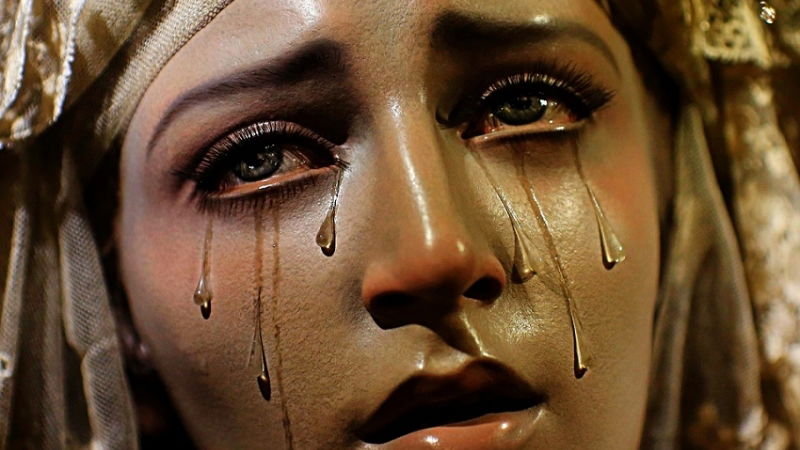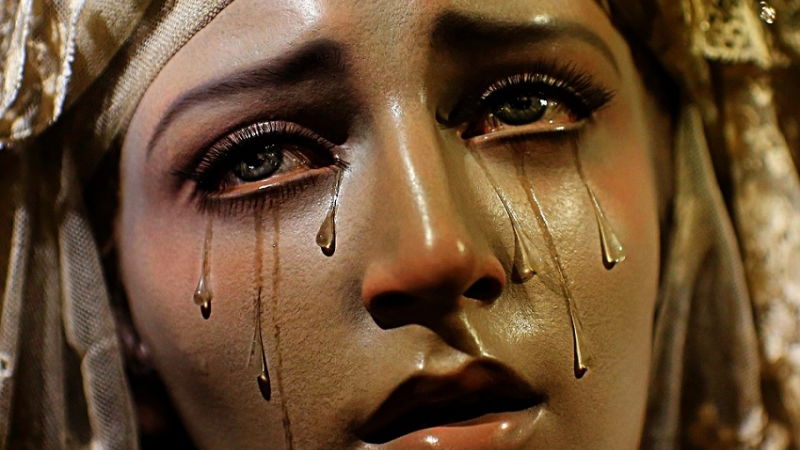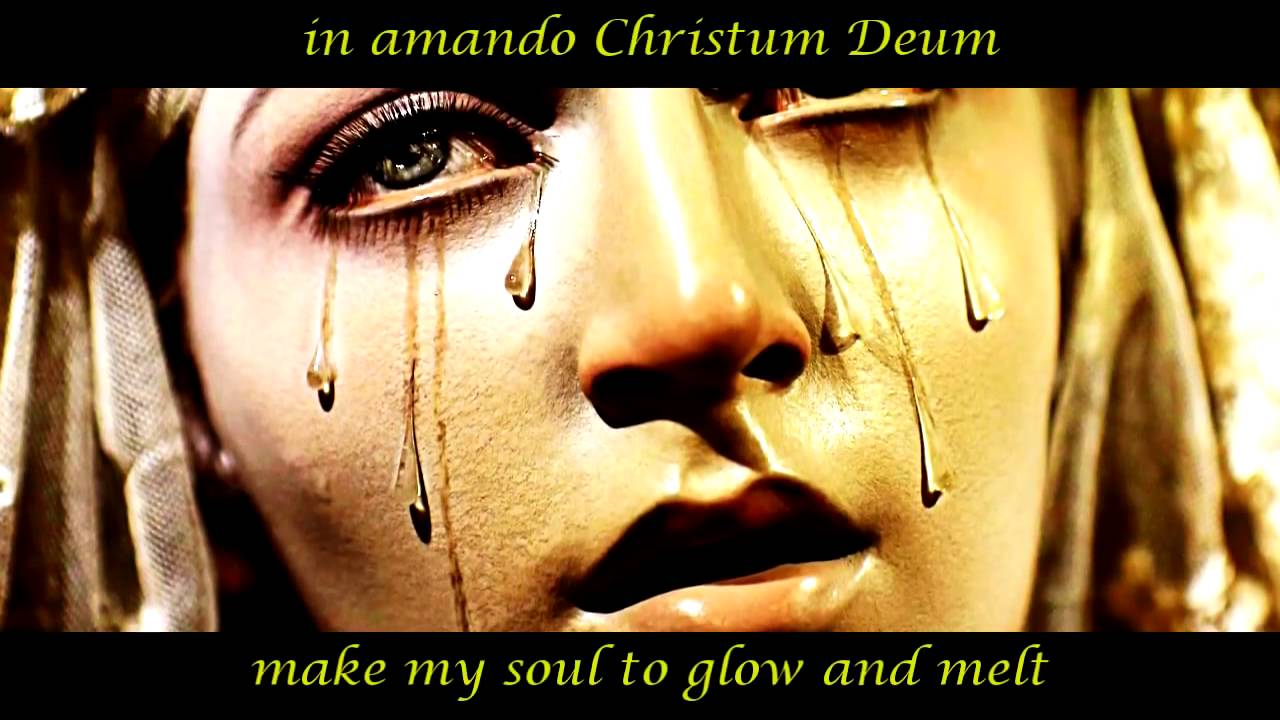THE SEVEN SORROWS OF MARY

First sorrow: the prophecy of Simeon
When the days of his purification were fulfilled, according to the Law of Moses, they brought him to Jerusalem to present him to the Lord, as it is written in the Law of the Lord: Every firstborn male shall be consecrated to the Lord, and to offer in sacrifice a pair of turtledoves or two young pigeons, according to that which is commanded in the Law of the Lord.
Now there was at that time in Jerusalem a man named Simeon; this righteous and devout man was waiting for the consolation of Israel, and the Holy Spirit was with him. It had been revealed to him by the Holy Spirit that he would not die before he saw the Lord's Christ. Moved by the Holy Spirit he came to the Temple; and as his parents brought in the child Jesus to fulfill what the Law prescribed concerning him, he took him in his arms and blessed God, saying, "Now, Lord, you may let your servant depart in peace, according to your word, for my eyes have seen your salvation, which you have prepared before the face of all peoples, a light for revelation to the Gentiles and glory to your people Israel."
His father and mother were amazed at the things that were said about him. Simeon blessed them and said to Mary, his mother, "See, this man has been destined to be the fall and resurrection of many in Israel, and as a sign of contradiction - and you yourself a sword will pierce your soul - so that the thoughts of many hearts may be revealed" (Lk 2:22-35).
Our Lady listens attentively to what God wants, ponders what she does not understand, asks what she does not know. Then, she gives herself totally to the fulfillment of the divine will: behold the handmaid of the Lord, let it be done to me according to your word. Do you see the wonder? St. Mary, teacher of all our conduct, teaches us now that obedience to God is not servility, does not subjugate the conscience: she moves us intimately to discover the freedom of the children of God.
Teacher of charity. Remember that scene of the presentation of Jesus in the temple. The old man Simeon "assured Mary, his Mother: Look, this child is destined for the ruin and resurrection of many in Israel and to be the target of contradiction; which will be for you a sword that will pierce your soul, so that the thoughts hidden in the hearts of many may be discovered". Mary's immense charity for humanity fulfills, also in her, Christ's affirmation: "Greater love has no one than this, that he lay down his life for his friends".
The Roman Pontiffs have rightly called Mary Co-redemptrix: "In such a way, together with her patient and dying Son, she suffered and almost died; and in such a way, for the salvation of mankind, she abdicated her maternal rights over her Son, and immolated him, as far as it depended on her, to placate the justice of God, that it can rightly be said that she redeemed the human race together with Christ". Thus we better understand that moment of Our Lord's Passion, which we will never tire of meditating on: stabat autem iuxta crucem Iesu mater eius, she was beside the cross of Jesus his Mother.
Second sorrow: the flight into Egypt
After he had departed, an angel of the Lord appeared to Joseph in a dream and said to him, "Arise, take the child and his mother, and flee to Egypt; stay there until I tell you, for Herod is going to seek the child to destroy him." He arose, took the child and his mother by night and went to Egypt. There he stayed until Herod's death, so that what the Lord announced through the prophet would be fulfilled when he said: "Out of Egypt I called my son" (Mt 2:13-15).
Mary cooperated with her charity so that the faithful might be born in the Church, members of that Head of which she is effectively mother according to the body. As Mother, she teaches; and, also as Mother, her lessons are not noisy. It is necessary to have in the soul a base of refinement, a touch of delicacy, in order to understand what she manifests to us, more than with promises, with works.teacher of faith: blessed are you who have believed, thus Elizabeth, her cousin, greets her when Our Lady goes up the mountain to visit her. Mary's act of faith was marvelous: behold the handmaid of the Lord, let it be done to me according to your word.
At the birth of her Son she contemplates the greatness of God on earth: there is a choir of angels, and both the shepherds and the mighty of the earth come to adore the Child. But then the Holy Family has to flee to Egypt, to escape the criminal attempts of Herod. Then, silence: thirty long years of simple, ordinary life, like that of just another household in a small village in Galilee.
The Holy Gospel, briefly, makes it easier for us to understand the example of Our Mother: Mary kept all these things within herself, pondering them in her heart. Let us try to imitate her, dealing with the Lord, in a loving dialogue, with everything that happens to us, even the smallest events. Let us not forget that we must weigh them, evaluate them, see them with the eyes of faith, in order to discover the Will of God.
If our faith is weak, let us turn to Mary. St. John tells us that through the miracle of the wedding feast at Cana, which Christ performed at the request of his Mother, his disciples believed in him. Our Mother always intercedes before her Son so that he may attend to us and show himself to us in such a way that we can confess: You are the Son of God.
Third sorrow: Jesus lost in the Temple
His parents went to Jerusalem every year to the feast of the Passover. And when he was twelve years old, they went up to the feast as was their custom. After those days, when they returned, the child Jesus remained in Jerusalem, unnoticed by his parents. Thinking that he was in the caravan, they spent a day looking for him among their relatives and acquaintances; but when they did not find him, they returned to Jerusalem in search of him. At the end of three days they found him in the Temple, sitting in the midst of the doctors, listening to them and asking them questions. All who heard him were amazed at his wisdom and his answers. When they saw him they marveled, and his mother said to him, "Son, why have you done this to us? See how your father and I, in our anguish, have been looking for you. And he said to them, "Why did you seek me? Did you not know that I must be about my Father's business?" But they did not understand the answer he gave them (Lk 2:41-50).
The Gospel has reminded us of that touching scene of Jesus, who stays in Jerusalem teaching in the temple. Mary and Joseph went the whole day, asking relatives and acquaintances. But when they did not find him, they returned to Jerusalem in search of him. The Mother of God, who eagerly searched for her son, lost through no fault of hers, who experienced the greatest joy in finding him, will help us to retrace our steps, to rectify what is necessary when we fail to distinguish Christ because of our lightness or sins. In this way we will reach the joy of embracing Him again, to tell Him that we will never lose Him again.
Where is Jesus? -Madam, the Child... where is He? Mary cries. -You and I have run from group to group, from caravan to caravan: you have not seen him. -Joseph, after making useless efforts not to cry, cries too.... And you... And me.
I, being a coarse little servant, weep loudly and cry to heaven and earth..., for when I lost him because of me and did not cry out. Jesus: may I never lose you again.... And then misfortune and pain unite us, as sin united us, and groans of deep contrition and ardent phrases come out of our whole being, which the pen cannot, must not stamp.
And, as we console ourselves with the joy of finding Jesus -three days of absence!- disputing with the Masters of Israel (Luke II, 46), the obligation to leave those of our house to serve the Heavenly Father will remain deeply engraved in your soul and mine.
Fourth sorrow: Mary meets her Son on the road to Calvary.
Hardly has Jesus risen from His first fall, when He meets His Most Holy Mother, beside the road along which He is passing. With immense love Mary looks at Jesus, and Jesus looks at His Mother; their eyes meet, and each heart pours into the other its own sorrow. Mary's soul is flooded with bitterness, in the bitterness of Jesus Christ: O you who pass by on the way, look and see if there is any sorrow like my sorrow (Lam I, 12). But no one notices, no one notices, only Jesus. The prophecy of Simeon is fulfilled: a sword will pierce your soul (Lk II, 35).
In the dark solitude of the Passion, Our Lady offers her Son a balm of tenderness, of union, of fidelity; a yes to the divine will. By the hand of Mary, you and I also want to console Jesus, accepting always and in everything the Will of his Father, of our Father. Only in this way will we taste the sweetness of the Cross of Christ, and embrace it with the strength of love, carrying it in triumph along all the roads of the earth.
Fifth Sorrow: Jesus dies on the Cross
Standing by the Cross of Jesus were his Mother and his mother's sister, Mary of Clopas, and Mary Magdalene. When Jesus saw his Mother, and the disciple whom he loved standing beside her, he said to his Mother, "Woman, behold your son. Then he said to the disciple, "Behold, your mother. And from that hour the disciple took her to himself. After this, when Jesus knew that all things were accomplished, that the scripture might be fulfilled, he said, "I thirst." And there was there a vessel full of vinegar; and they tied a sponge soaked in the vinegar to a branch of hyssop, and put it to his mouth. When Jesus had taken the vinegar, he said, "All is finished." And bowing his head, he gave up his spirit (Jn 19:25-30).
At the scandal of the Sacrifice of the Cross, St. Mary was present, listening with sadness to those who passed by, and blasphemed, shaking their heads and shouting: You who tear down the temple of God, and in three days rebuild it, save yourself; if you are the Son of God, come down from the Cross. Our Lady listened to the words of her Son, joining in his pain: My God, my God, why have you forsaken me? What could she do? To merge with the redeeming love of her Son, to offer to the Father the immense pain - like a sharp sword - that pierced his pure Heart.
Once again Jesus is comforted by the discreet and loving presence of his Mother. Mary does not cry out, she does not run from one side to the other. Stabat: she is standing next to her Son. It is then that Jesus looks at her, then looks at John. And he exclaims: Woman, behold your son. Then he says to the disciple: there is your Mother. In John, Christ entrusts to his Mother all men and especially his disciples: those who were to believe in him.
Felix culpa, sings the Church, happy guilt, because she has attained to have such a great Redeemer. Happy fault, we can also add, that we have deserved to receive Holy Mary as our Mother. We are already sure, nothing should worry us anymore: because Our Lady, crowned Queen of heaven and earth, is the omnipotence supplicant before God. Jesus can deny nothing to Mary, nor can He deny anything to us, children of His own Mother.
Sixth sorrow: Jesus is taken down from the Cross and handed over to his Mother.
In the evening, as it was the parasceve, that is, the eve of the Sabbath, Joseph of Arimathea, an illustrious member of the Sanhedrin, who was also waiting for the kingdom of God, came and boldly went to Pilate and asked for the body of Jesus. Pilate was surprised that he had already died and, calling the centurion, asked him if he had already died. On being assured by the centurion, he handed the body to Joseph. The latter bought a sheet; he took him down and wrapped him in the sheet, laid him in a tomb that was hewn out of the rock, and rolled a stone to the door of the tomb (Mk 15:42-46).
Now, standing before that moment of Calvary, when Jesus has already died and the glory of his triumph has not yet been manifested, it is a good occasion to examine our desires for Christian life, for holiness; to react with an act of faith to our weaknesses, and trusting in the power of God, to make the resolution to put love into the things of our day. The experience of sin should lead us to sorrow, to a more mature and deeper decision to be faithful, to truly identify ourselves with Christ, to persevere, whatever the cost, in that priestly mission that he has entrusted to all his disciples without exception, which urges us to be salt and light of the world.
It is time for you to go to your blessed Mother in Heaven, so that she may take you in her arms and obtain for you from her Son a look of mercy. And try immediately to make concrete resolutions: cut at once, even if it hurts, that detail that hinders, and that God and you know well. Pride, sensuality and a lack of supernatural sense will join forces to whisper to you: "But it's just a silly, insignificant circumstance! You answer, without any further dialogue with temptation: I will also give myself to this divine demand! And you will not be wrong: love shows itself in a special way in small things. Ordinarily, the sacrifices that the Lord asks of us, the most arduous ones, are minuscule, but as continuous and valuable as the beating of our heart.
Seventh sorrow: they bury the body of Jesus.
After this, Joseph of Arimathea, who was a disciple of Jesus, though secretly for fear of the Jews, asked Pilate for permission to remove the Body of Jesus. Pilate granted it. So he went and removed the body of Jesus. Nicodemus also came - the one who had gone to him by night before - bringing a mixture of myrrh and aloes, about a hundred pounds. They took the body of Jesus and bound it with linen cloths and spices, as the Jews are accustomed to bury. And there was a garden in the place where he was crucified, and in the garden a new tomb, in which no one had yet been buried. Since it was the preparation of the Jews, and because of the proximity of the tomb, they laid Jesus there (Jn 19:38-42).
Let us now ask the Lord, to conclude this time of conversation with him, to grant us to repeat with St. Paul that "we have triumphed by virtue of him who loved us. For I am sure that neither death, nor life, nor angels, nor principalities, nor virtues, nor things present, nor things to come, nor power, nor height, nor depth, nor any other creature can ever separate us from the love of God, which is in Jesus Christ our Lord".
Scripture also sings of this love in glowing words: the mighty waters could not quench charity, nor the rivers sweep it away. This love always filled the Heart of Holy Mary, to the point of enriching her with the bowels of a Mother for all humanity. In the Virgin, love for God is also confused with solicitude for all her children. Her most sweet and attentive Heart must have suffered greatly, down to the smallest details - they have no wine - when she witnessed that collective cruelty, that cruelty which was, on the part of the executioners, the Passion and Death of Jesus. But Mary does not speak. Like her Son, she loves, keeps silent and forgives. That is the power of love.


